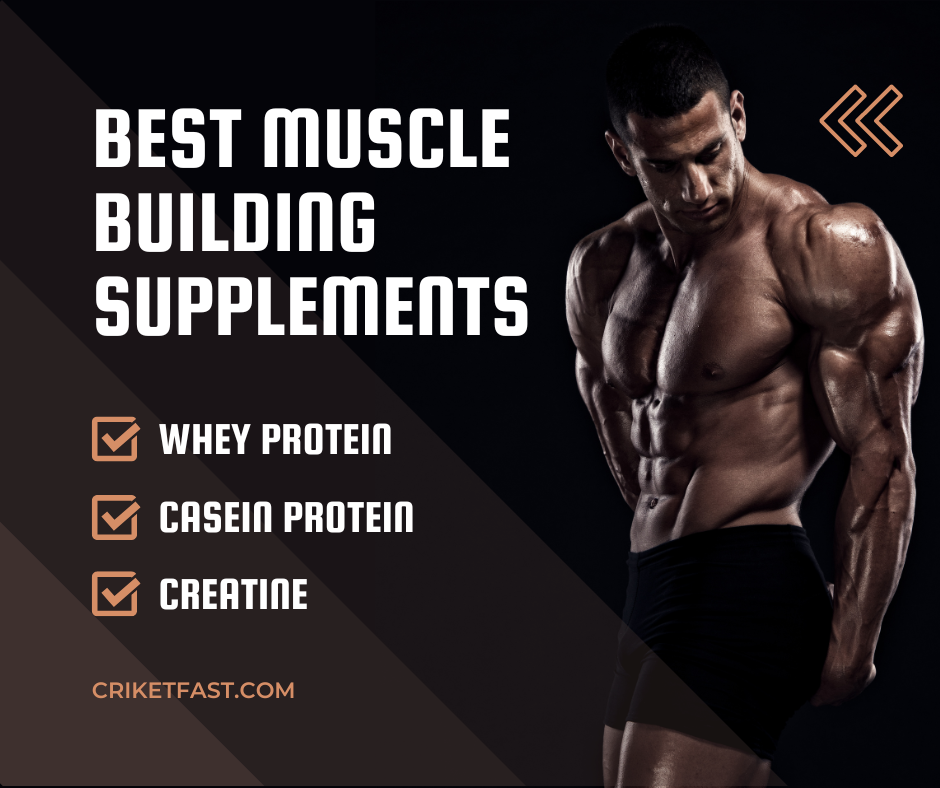The 5 Best Muscle-building Supplements For Muscle Growth
Muscle-building supplements are essential for muscle growth and development. They provide essential nutrients and compounds that help with muscle recovery, muscle synthesis, and overall muscle performance.
So many muscle-building supplements are on the market, ranging from the most popular options such as whey protein, creatine, and more, to more specialized formulations such as beta-alanine, nitric oxide boosters, and more.
It’s important to understand the details of each supplement and its specific benefits to make informed decisions.
In this article, we’ll explore the science behind muscle-building supplements. We’ll also provide practical insights on how to use them.
We’re here to empower you on your fitness journey, helping you understand how supplements can complement your training efforts.
Join us for an informative exploration of all things muscle-building, and unlock the potential to maximize your gains in pursuit of a strong, fitter, healthier physique.

Importance of supplements in muscle building
Protein supplementation increases muscle mass and enhances resistance training. The effects are most pronounced in people who have already been trained in resistance exercises such as weightlifting. Older people are more likely to experience the effects of protein supplementation than younger people.
Smart eating and physical activity have similar impacts on our health. Some of the health benefits include:
Reduce the risk of chronic conditions, including diabetes, cardiovascular disease, hypertension, stroke, and certain cancers and related conditions.
Prevent weight increase and support weight loss.
Whey protein
Whey is the residue left over after the milk has been centrifuged and strained. It comes from cheese or casein production and has several commercial applications. Sweet whey comes from the production of rennet-rich hard cheeses, such as cheddar or Swiss cheese.
Due to its high rate of absorption, whey protein has a high rate of increase in muscle growth when consumed immediately before or after exercise, since muscle protein synthesis is typically highest in the immediate post-workout period.
Casein protein
Casein protein is one of the slow-absorbing proteins. This means that you will have a constant supply of amino acids to your muscles while you sleep.
100% mousellar casein has 24 grams of protein. It has a silky, smooth texture and can be used in shakes, smoothies oats, and home baking.
Overnight recovery products often use casein as the main source of protein due to its slower absorption kinetics. Since this is usually the longest time of the day without nutrients, casein can deliver amino acids for extended periods when consumed before bed.
Creatine
Creatine boosts strength and power ATP, which is the primary energy source for intense exercise. Since creatine increases phosphocreatine levels and boosts ATP production, creatine is one of the few supplements repeatedly shown to boost strength and power.
Pre-Workout Supplements
1-Caffeine
Caffeine is one of the most popular pre-workout ingredients in supplements because it helps boost energy and concentration during exercise by blocking the receptors in the brain that produce adenosine. This helps reduce fatigue and boost alertness during exercise.
Caffeine has been shown to improve athletic performance by improving endurance, strength, and speed, according to research published in 2021 in the Journal of the International Society of Sports Nutrition. However, too much caffeine can cause side effects like anxiety, jitteriness, and insomnia.

2- Beta-Alanine
According to a study published in Nutrients in 2023, beta-alanine delays fatigue and allows you to work harder for longer periods.
Carnosine
Beta-alanine is an amino acid that is not essential for the production of carnosine. This amino acid helps to neutralize muscle acid during exercise, according to a 2021 study published in the Journal of Environmental.
3- BCAAs
BCAAs are a group of amino acids that make up the building blocks of muscle. These three amino acids are leucine (1), isoleucine (2), and valine (3). A 2022 systematic review published in Nutrients suggests that BCAAs may help reduce muscle fatigue and soreness during exercise.
Post-Workout Nutrition
-
Replenishing glycogen stores:
Carbohydrates (glycogen) are burned during long or intense workouts. Eating carbohydrates shortly after exercise helps your body rebuild glycogen stores. An athlete should eat about ½ gram of carbohydrates for every pound of body weight they weigh, or 75 grams for an athlete weighing 150 pounds.
-
Repairing damaged muscle:
Exercise causes the breakdown of muscle tissue, and the foods you eat after exercise can help repair that tissue, as well as rebuild and strengthen muscle. Eating 20-40 g of high-quality, lean protein after exercise maximizes protein synthesis to repair muscle tissue and increase muscle growth.
When you’re playing tournament play or doing multiple workouts in one day that leave less than two hours for recovery, you may want to wait to eat protein until after you’ve finished (or eat less). Understanding your body’s response to protein will help you decide what’s best for you.
-
Rehydrating:
Athletes lose a lot of fluid and electrolytes when they sweat. For every pound of water lost, an athlete needs 20 to 24 ounces of fluid. Water is usually sufficient. However, sports drinks that contain electrolytes and carbs can help make up for what your body has lost during a workout, especially one that lasts more than 60 minutes.
Athletes need to stay hydrated in addition to working out. This means drinking water before, during, and after your workout. According to the American College of Sports Medicine, 16 to 24 ounces of water are recommended 2 to 3 hours before your workout, 4 to 8 ounces every 15 to 20 minutes during your workout and 16 to 24 ounces for each pound of fluid lost after your workout.
Your recovery needs will depend on how long and intense your workout is. You don’t have to consider recovery eating for every workout. For example, a light to moderate workout (less than an hour) doesn’t necessarily require refueling.
On the other hand, if you do high-intensity interval training, plan on training more than once a day, or have a very intense workout, you will benefit from a meal or snack after your workout.
Conclusion
In conclusion, muscle-building supplements are important for muscle growth and development, and they provide essential nutrients and compounds for muscle recovery and performance. Whey protein, casein protein, and creatine are popular supplements that have been shown to enhance muscle growth and strength.
Pre-workout supplements like caffeine, beta-alanine, and BCAAs can improve energy, and endurance, and reduce fatigue during exercise. Post-workout nutrition should focus on replenishing glycogen stores, repairing damaged muscle tissue, and rehydrating the body. Understanding your body’s needs and response to supplements and nutrition can help maximize your gains and support a strong, fitter, and healthier physique.
Read: The Best Zumba Classes For Everyone Everyday

FAQS For Muscle-Building Supplements
Q: How do muscle-building supplements work?
These supplements contain key nutrients and active ingredients that aid in muscle recovery, muscle repair, and muscle growth, as well as providing an additional source of protein and key building blocks for muscle growth and maintenance.
Q: What are some common ingredients found in muscle-building supplements?
Proteins, creatine, BCAAs (Branched-Chain Amino Acids), and glutamine are some of the most common ingredients in muscle-building supplements.
Q: Why are these ingredients important for muscle growth?
Protein helps build and repair muscle tissue. Creatine increases muscle strength and muscle endurance.BCAAs and glutamine help restore and grow muscle tissue.
Q: Are muscle-building supplements safe to use?
As with any supplement, you should always consult your doctor before adding any muscle-building supplement to your routine. You should also never exceed the recommended dosage.
Q: Can muscle-building supplements replace a healthy diet and exercise?
Muscle-building supplements aren’t meant to be a substitute for healthy diet and exercise. They’re meant to help you build muscle, not replace it.


1 thought on “The 5 Best Muscle-Building Supplements For Muscle Growth”
Comments are closed.